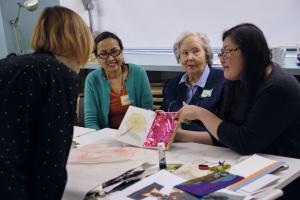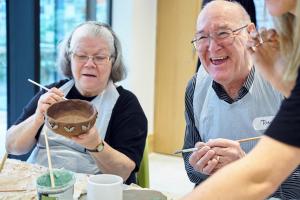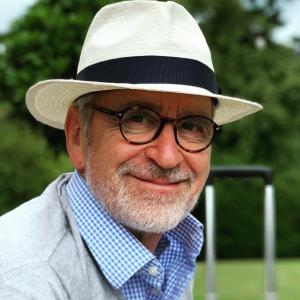Creative power
Following her mother-in-law Connie’s diagnosis of dementia, Jeanne Pring, 58, from London, has taken her to numerous workshops run by Arts 4 Dementia. She tells us how the charity provides support, stimulation and a social network for them both
“By the time he passed away in 2017, my husband and I had moved in with him and mum to help look after them, so I took over her care. We’d always been close and neither myself nor my husband liked the idea of putting her into a home. I took her for a medical check at the GP and raised the concern she might have dementia, so they referred her for a test and scan which confirmed this. She was diagnosed with mixed dementia, comprising vascular dementia, Alzheimer’s disease and frontotemporal dementia, which all affect different parts of the brain. It was not a surprise, but it was a heartbreaking diagnosis, and my husband and I knew we would have a difficult journey ahead.”
Jeanne started researching dementia. “I didn’t know anything about it or how to care for someone affected by it, so I did a lot of research to see how I could best support mum. A lot of it was trial and error, especially as her symptoms progressed. “Within a year of her diagnosis she had stopped communicating beyond one or two words at a time and found it difficult to understand what we were saying. She would also get very agitated and aggressive at times because it was frustrating for her not understanding what was going on.
“It was difficult for my husband to see his mum’s personality slip away, and it was also a tough journey for me as her full-time carer. At the beginning I didn’t have any help at all and was looking after mum 24/7 doing everything, including her personal care, looking after the house and cooking and cleaning. I lost touch with my friends because I wasn’t as available or flexible to make plans with them, and I also had to give up my jewellery business. I poured my heart and soul out and forgot to look after myself too, and I ended up quickly burning out.” Jeanne started looking for what support was available, both for Connie and herself as a carer. “I wanted to keep her stimulated and connected to others by taking her to things I thought she would enjoy and would benefit her cognitively, and I was also keen to find things I would genuinely get enjoyment from too. I realised I had to look after myself as well as mum because if I didn’t, I would fall apart.”
Jeanne came across the charity Arts 4 Dementia – which develops activities at arts centres for people in the early stages of dementia and their carers – and was keen to give some of their workshops a go. “The first workshop we attended was at the Royal Opera House, where we were taught to do ballet movements to music. It was so much fun for both mum and me and in really beautiful surroundings.
“We have since taken part in a variety of workshops, which are normally hosted weekly for around eight weeks. We also regularly attend the charity’s monthly concerts. Thanks to the charity, we have been able to try a variety of activities we probably wouldn’t have been able to otherwise access, such as storytelling and singing. We also started doing a clay programme, which was developed by Arts 4 Dementia but has been continued by the venue, whose staff are now trained in delivering arts workshops.
“Although mum isn’t as able to join in with things as much as she was, I can tell she enjoys many of the workshops. They provide some stimulation for her and she often laughs and smiles.”
The charity’s workshops have helped Jeanne herself stay connected. “Being a carer can be isolating. Even though I have some help from paid carers now, caring for mum is my responsibility, and it impacts on my ability to spend time with others or do things I enjoy.
“Being able to meet regularly with people at the workshops has been amazing, as it helps me connect with those going through a similar experience and ease the isolation. It has given me an outlet for my creativity.”
During the coronavirus pandemic, Jeanne and Connie have continued to do creative sessions online. “We attend the charity’s Chatty Wednesday sessions and we have also continued to do our clay sessions using clay sent to us by the organisation and building things under guidance from the instructor. One of the best things about doing these sessions is that my husband is working from home so gets to join in as well. Before the pandemic, it was usually me and mum doing things together so the bonding happened between us. It’s been really special for my husband to be able to spend time with his mum and create precious memories with her.
“One of the projects we did in our clay workshop was to make a building, so my husband – who is an architect – and I decided to do a joint project and make a model of our house. When it was done, mum actually recognised it was our house, which was brilliant. It was a special project and something to keep as a reminder of happy times together.”
Despite Connie’s decline, Jeanne believes the activities provided by Arts 4 Dementia have helped ensure she has a good quality of life. “I don’t think mum understands or remembers about her diagnosis but she is very happy because we give her a good life and I am so grateful for the charity’s support. “Arts 4 Dementia is catering for
a group of people that don’t normally have a voice and helping to give them access to such wonderful opportunities. Any creative activity benefits the brain and provides vital stimulation, which makes a huge difference to people with dementia like mum.”
Arts 4 Dementa 2021
Total raised: £27,221
Arts 4 Dementia is using the money raised in the Candis Big Give to train and work with major arts organisations throughout the country in 2021, to help them deliver arts opportunities and to stimulate, re-energise and inspire those living with dementia at home. The workshops offer an effective intervention for people affected by dementia, enabling participants to experience the joy and satisfaction of using their own creativity, revive an old skill or learn a new one, exercise their brain and socialise with others. They also provide an opportunity for carers to create social networks for support and build joyful memories with those that they care for.The training will allow organisations to learn how to engage effectively with people diagnosed with dementia, offer artistic opportunities and to see the person not the illness. They will then deliver inspirational seed workshop programmes, lasting 8-10 weeks. Once these programmes have come to an end, many organisations and trained facilitators choose to continue to run the programmes for those living with dementia. During the coronavirus pandemic, training and workshops have taken place online to allow those with dementia and their carers to continue taking part in stimulating and engaging activities during this difficult time.
The charity will also use the money to support their work promoting their arts programme to social prescribers so that rather than being given drugs, dementia patients are guided towards arts and outdoor activities. And also to help provide a signposting service to nationwide arts opportunities.
To find out more, go online and visit arts4dementia.org.uk
What Arts 4 Dementia means to me
Nigel Franklin, CEO for Arts 4 Dementia, explains why the work of the charity is so special
“Arts 4 Dementia was founded by my sister Veronica in 2009 after she witnessed the amazing effect of the arts on my mother, who was living with advanced dementia and was virtually non-verbal. Veronica had a professional cellist lodging with her who kindly offered to play for our mother. As he played in her living room, our mum’s eyes lit up and she was clearly enjoying the music. She then astonished everyone afterwards by telling them how much she had enjoyed it and asking about his career. It was clear something extraordinary had happened and it prompted Veronica to research the effects of arts and music on people with dementia, which led to the creation of the charity. When Veronica decided to focus on other projects in 2015, I resigned my trusteeship of the charity and took over as Chief Executive to continue its amazing work.
We partner with arts and heritage organisations to help them deliver free workshop programmes for people with dementia. We train the arts facilitators, find volunteers to
help, and support the participants throughout the 8-10-week seed initiative programme. Many organisations then decide to continue with the programme after this has ended, which is really satisfying. We have worked with all sorts of organisations and trained over 850 arts facilitators so far – who will now be reaching well over 16,000 people affected by dementia a year. We use quality materials, great buildings and talented facilitators to help people feel inspired, and when people come to the workshops, they absolutely love them. We have been told people feel like they’re fighting back against the disease, and the results we see are extraordinary. One of the symptoms of dementia can be apathy and people often feel like they can’t do the activities, but we provide an encouraging hand on their shoulder and the support to give things a go. We’ve seen people discover a talent or something they really enjoy. That’s a real breakthrough and what makes the job so wonderful – to see people amazing themselves by what they can do.”





Leave a Reply
Please login or register to leave a comment.